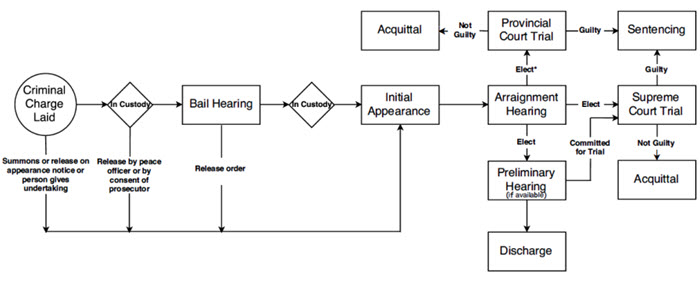The Criminal Code of Canada sets out the procedures to be followed in criminal cases.

Stages in a Criminal Case
The stages in a criminal case where Provincial Court judges or judicial justices preside are:
Bail hearing
Initial Appearance
Arraignment Hearing
Preliminary Hearing
Provincial Court Trial
Sentencing
Definitions and terms used in criminal cases.
Arraignment: A formal court appearance where the accused person enters
a plea of guilty or not guilty in the presence of a Judge
Committed: If you are committed for trial in the Supreme Court,
your trial will be heard by a Supreme Court Judge or Supreme
Court Judge with a Jury
Sentence: The penalty a judge imposes when someone is found
guilty. Can include jail time, fine, probation, etc.
Discharge: Where there is not enough evidence at a preliminary
hearing to commit the matter to trial in the Supreme Court of BC
Elect: Choose which court to be tried in
Summary vs. Indictable Offence: There are three types of offences
(crimes): Summary Offences, Indictable Offences, and
Dual or Hybrid
- Less serious crimes use what is known as the “summary conviction process”. The court process is simpler and the penalties are lower.
- More serious crimes proceed “by indictment”.
- Many crimes are “dual procedure” or "hybrid" meaning the Crown chooses whether it will proceed summarily or by indictment.
This website provides general information only and should not be used as a substitute for legal advice.
Updated February 2020

